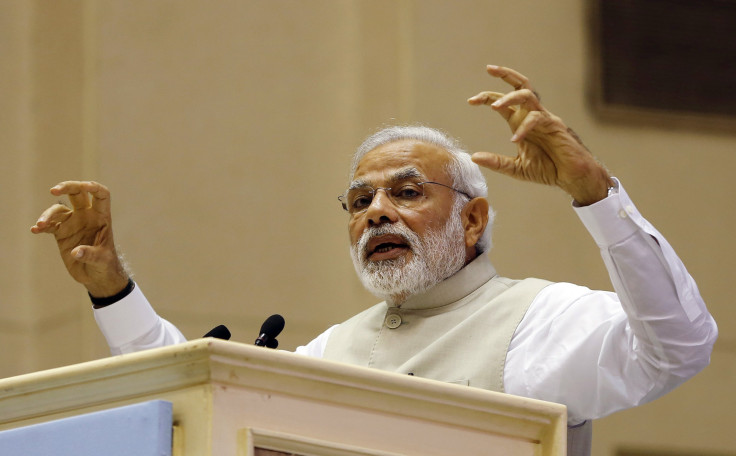Narendra Modi Says His Government Will Not Allow Religious Groups To Incite Hatred

NEW DELHI: Indian Prime Minister Narendra Modi said Tuesday that his government “will not allow any religious group, belonging to majority or minority to incite hatred against others” and that his government will “ensure that there is complete freedom of faith.”
Modi was speaking in New Delhi at an event organized by the Christian community, whose places of worship and missionary schools have come under attack in the last few months after Modi’s government came to power in May last year.
“This principle of equal respect and treatment for all faiths has been a part of India's ethos for thousands of years,” Modi said, adding: “Everyone has the undeniable right to retain or adopt the religion of his or her choice without coercion or undue influence.”
Last month, U.S. President Barack Obama, who was on a three-day visit to India, said that India could only succeed if it isn’t “splintered” along religious lines. Obama was possibly alluding to the issue of religious conversions that had gained prominence in India since the right-wing Bharatiya Janata Party (BJP) came to power under Modi’s prime ministership.
"Our freedom of religion is written into our founding documents, it's part of America’s very First Amendment. Your Article 25 says that all people are equally entitled to freedom of conscience, and the right freely to profess, practice and propagate religion," Obama had said. "In all countries, upholding this fundamental freedom is the responsibility of government, but it's also the responsibility of every person."
A few days later, Obama said that “acts of intolerance,” in India “would have shocked Gandhiji, the person who helped to liberate that nation.”
“Michelle and I returned from India -- an incredible, beautiful country, full of magnificent diversity -- but a place where, in past years, religious faiths of all types have, on occasion, been targeted by other peoples of faith, simply due to their heritage and their beliefs -- acts of intolerance that would have shocked Gandhiji, the person who helped to liberate that nation,” he had said.
Although India has a majority Hindu population, its constitution defines it as a secular nation that guarantees equal rights and freedoms to people of all religions. India is home to about 24 million Christians, who make up about 2.3 percent of the country’s population, forming the third largest religious group after Hindus and Muslims. According to India’s 2001 census, the latest available data, just under 1 percent of Delhi’s residents are Christians.
With the resurgence of the BJP, religion has yet again assumed significance in the country’s national political discourse. Some BJP-affiliated, right-wing organizations and some BJP members of parliament had threatened to convert thousands of Muslims and Christians to Hinduism, and also allegedly took a step in that direction early December. Following race riots in Modi's home state of Gujarat in 2002, he was denied a visa by the U.S., but relations between the two have thawed since he was absolved of involvement in the riots by India's apex court, and later became the country's prime minister after achieving a landslide victory in last year's general election.
Apart from Christians, Muslims too have been targeted by BJP affiliates. After Modi took office, parts of Uttar Pradesh state and the national capital New Delhi saw several instances of Hindu-Muslim clashes.
As prime minister, Modi condemned before parliament anti-Muslim remarks by one of his ministers, who later apologized.
In recent times, radicalization of Indian Muslim youth has been on the rise, and Islamist outfits, eager to feed on the phenomenon, are keen to recruit cadres in the country. Al Qaeda has, in recent past, said that it would expand its presence in India.
According to annual data released by the Indian government, published in August last year, instances of communal rioting rose by 25 percent in 2013. Government data further showed that until September this year, 66 Muslims and 41 Hindus had been killed in communal clashes.
Several factors including a perceived persecution of Muslims, who make up a little over 13 percent of the Indian population, and the six-decade old India-Pakistan rivalry over the state of Jammu and Kashmir, have led to several Indian Muslims turning to jihad. Islamic radicalization is not a new phenomenon in India and goes as far back as 1989, when a Hyderabad resident, Abdul Aziz, was motivated to jihad in Saudi Arabia, according to a report by Hindustan Times, a local Indian newspaper.
Later events, including, most notably, the demolition of the Babri mosque by right-wing Hindu groups in the city of Ayodhya in December 1992 and the 2002 Hindu-Muslim riots in Gujarat state, have only deepened the sense of alienation among several Indian Muslims.
© Copyright IBTimes 2024. All rights reserved.











